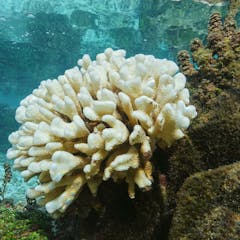
Articles on Coral reefs
Displaying 1 - 20 of 212 articles

Increasing coral bleaching will be worst for the most biodiverse reefs along the equator, impacting the livelihoods and nutrition of the people who depend on them.

Coral reefs share genetic material across wide areas, with help from ocean currents. This ability is especially important during episodes like the mass bleaching currently occurring.

Sea cucumbers have been overharvested for centuries. At the same time, coral reefs have declined as well. Research suggests that saving the former may help restore the latter.

Around the world, coral reefs are suffering. But scientists in high-income nations are developing new ways to build coral resilience. We have a duty to share our skills and build capacity elsewhere.

Baby corals may hold promise for building coral reef resilience in Seychelles and beyond.

Bleached coral draws our attention, but marine heat does damage to many unseen parts of these ecosystems.

Overall, coastal habitat restoration greatly increases animal numbers and diversity. But not all projects deliver the goods and we need to find out why.

Just as the world’s zoos breed critically endangered animals in captivity to repopulate the wild, scientists are building a global effort to freeze corals for reef restoration.

For decades, conservationists have tried to repopulate dead reefs with corals reared elsewhere.

Artificial reef stars have been added to damaged coral reefs in Sulawesi, Indonesia. A new study shows that within just four years, restored reefs are thriving as much as healthy reefs.

The best strategy to protecting Earth’s coral reefs is to dramatically cut greenhouse gas emissions. But in the meantime, we must urgently make corals more resilient.

Deeper ocean habitats (30-150 metres) are a key feeding ground for critically endangered hawksbill turtles.

Our new maps show coral reefs are more extensive than we thought.

Photogrammetry, a technique where 3D information is extracted from photographs, is reducing the guesswork in counting – and understanding – the world below the ocean surface.

Artificial reefs are structures that humans put in place underwater that create habitat for sea life. A new study shows for the first time how much of the US ocean floor they cover.

There are so many fish in the ocean that if you took them out, important habitats and food sources for many creatures would be lost.

Reef sculptures are a form of artifical reef: man-made structures placed into an aquatic environment to mimic certain characteristics of a natural reef.

Severe bleaching is forecast to hit 12 Indonesian marine protected areas every year by 2030 – then spread to other areas. Here’s what locals, experts and the government say we need to do to save them.

Concrete structures can recreate the complex forms of reefs, offering refuge to wildlife.

Nature’s ultimate coral predator could benefit from climate change by surviving heatwaves and lie in wait for the right moment to feast on the reef.
